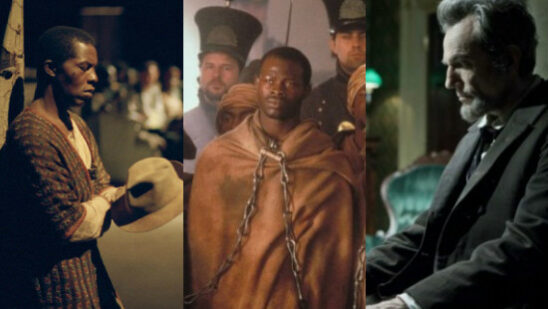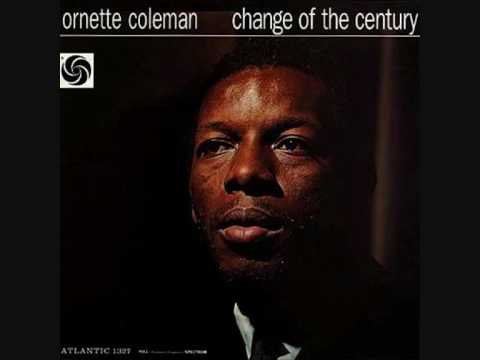Like many of Ornette Coleman’s Atlantic sides, The Art of the Improvisers was recorded in numerous sessions from 1959-1961 and assembled for the purpose of creating a cohesive recorded statement. Its opening track, “The Circle with the Hole in the Middle,” from 1959, with the classic quartet of Don Cherry, Ed Blackwell, and Charlie Haden, is one of Coleman’s recognizable pieces of music. Essentially, the band is that quartet with two very notable exceptions: The last tracks on each side feature a different bass player. On the end of side one, the great Scott LaFaro weighs in on “The Alchemy of Scott La Faro,” and Jimmy Garrison weighs in on “Harlem’s Manhattan” to close the album out. These last two sessions were recorded early in 1961, in January and March respectively. As an album, The Art of the Improvisers is usually undervalued when placed next to This Is Our Music or The Shape of Jazz to Come. This is a mistake in that some of Coleman’s most deeply lyrical harmonic structures reside here in tracks such as “Just for You,” with literally stunning intervallic interplay between him and Cherry from the middle to the end. The track also messes with standard blues form and comes up in a modal way without seemingly intending to. The set roars into “The Fifth of Beethoven,” which collapses a series of flatted fifths around Haden and Cherry, and Coleman goes on a Texas blues spree in his solo, dancing all around them. “The Alchemy of Scott La Faro” must have pissed off the hard boppers like nothing else. Here is a straining sprint that the quartet takes in stride as LaFaro and Blackwell charge around the edges in frightening time signatures. Coleman and Cherry for the most part clamor around a B flat-C sharp major figure and run circles around each other in muscular fashion as LaFaro goes pizzicato to head with Coleman in the middle, turning the saxophonist’s phrases into rhythmic structures which Blackwell accents as if cued. But he’s not; this is invented on the spot. Coleman’s deep lyricism shines through despite the tempo, and the entire thing goes out in a blaze of light. “The Legend of Bebop” is a jazz history lesson with the band working out on the front line, quoting from Sidney Bechet and Louis Armstrong, moving through some Ellingtonian themes, and slipping around the corner to a slow, blued-out bebop before taking off in consonant solos and counterpoint. “Harlem’s Manhattan,” with Garrison in Haden’s bass chair, begins with a quote right from Parker and Gillespie before challenging the framework of the blues and its tempos. Blackwell is a blur of the dance, his cymbal work against Garrison’s punctuated accents make Coleman’s and Cherry’s jobs knotty and difficult, but always rooted in the melody that blues inspires. This is basically one of Coleman’s most uptempo records for Atlantic, but also one of his most soulful. It deserves serious re-evaluation.
Tracklist:
01 – The Circle With A Hole In The Middle (Recorded on October 9, 1959)
02 – Just For You (Recorded on May 22, 1959)
03 – The Fifth Of Beethoven (Recorded on July 26, 1960)
04 – The Alchemy Of Scott Lafaro (Recorded on January 31, 1961)
05 – Moon Inhabitants (Recorded on July 26, 1960)
06 – The Legend Of Bebop (Recorded on July 26, 1960)
07 – Harlem’s Manhattan (Recorded on March 27, 1961)
Musicians:
Ornette Coleman – alto saxophone; tenor saxophone on “Harlem’s Manhattan”
Don Cherry – pocket trumpet; cornet on “Just for You”
Charlie Haden – bass on 1959 and 1960 tracks
Scott LaFaro – bass on “The Alchemy of Scott LaFaro”
Jimmy Garrison – bass on “Harlem’s Manhattan”
Billy Higgins – drums on 1959 tracks
Ed Blackwell – drums on 1960 and 1961 tracks
Ornette Coleman – Twins (1971/2018)
FLAC (tracks) 24-bit/192 kHz | Time – 43:25 minutes | 1,76 GB
Studio Mono Master, Official Digital Download | Artwork: Front cover
Ornette Coleman’s Twins (first issued on LP in 1971) has been looked at as an afterthought in many respects. A collection of sessions from 1959, 1960, and 1961 with different bands, they are allegedly takes from vinyl LP sessions commercially limited at that time to 40 minutes on vinyl, and not initially released until many years later. Connoisseurs consider this one of his better recordings in that it offers an overview of what Coleman was thinking in those pivotal years of the free bop movement rather than the concentrated efforts of The Art of the Improvisers, Change of the Century, The Shape of Jazz to Come, This Is Our Music, and of course the pivotal Free Jazz. There are three most definitive selections that define Coleman’s sound and concept. “Monk & the Nun” is angular like Thelonious Monk, soulful as spiritualism, and golden with the rhythm team of bassist Charlie Haden and drummer Billy Higgins driving the sweet and sour alto sax of Coleman and piquant trumpeting of Don Cherry. “Check Up” is a wild roller coaster ride, mixing meters, tempos, and dynamics in a blender in an unforgettable display of sheer virtuosity, and featuring bassist Scott LaFaro. “Joy of a Toy” displays the playful Ornette Coleman in interval leaps, complicated bungee jumps, in many ways whimsical but not undecipherable. It is one of the most intriguing of all of Coleman’s compositions. Less essential, “First Take” showcases his double quartet in a churning composition left off the original release This Is Our Music, loaded with interplay as a showcase for a precocious young trumpeter named Freddie Hubbard, the ribald bass clarinet of Eric Dolphy, and the first appearance with Coleman’s groups for New Orleans drummer Ed Blackwell. “Little Symphony” has a great written line with room for solos in a joyful hard bop center with the quartet of Coleman, Cherry, Haden, and Blackwell. All in all an excellent outing for Coleman from a hodgepodge of recordings that gives a broader view of his vision and the music that would come later in the ’60s.
Tracklist:
01 – First Take (Recorded on December 21, 1960)
02 – Little Symphony (Recorded on July 19, 1960)
03 – Monk And The Nun (Recorded on May 22, 1959)
04 – Check Up (Recorded on January 31, 1961)
05 – Joy Of A Toy (Recorded on July 26, 1960)
Musicians:
Ornette Coleman – alto saxophone
Don Cherry – pocket trumpet; cornet on “Monk and the Nun”
Charlie Haden – bass on 1959 and 1960 tracks
Scott LaFaro – bass on “First Take” and “Check Up”
Billy Higgins – drums on “First Take” and “Monk and the Nun”
Ed Blackwell – drums on 1960 and 1961 tracks
Freddie Hubbard – trumpet on “First Take”
Eric Dolphy – bass clarinet on “First Take”
Ornette Coleman – To Whom Who Keeps A Record (1975/2018)
FLAC (tracks) 24-bit/192 kHz | Time – 40:18 minutes | 1,3 GB
Studio Mono Master, Official Digital Download | Artwork: Front cover
To Whom Who Keeps a Record is a compilation album credited to jazz composer and saxophonist Ornette Coleman, released by the Japanese subsidiary Warner Pioneer of Warner Bros. Records in 1975. The album was assembled without Coleman’s input, comprising outtakes from Atlantic Records recording sessions of 1959 and 1960 for Change of the Century and This Is Our Music. Sessions for “Music Always” took place at Radio Recorders in Hollywood, California; all others at Atlantic Studios in New York City. The track titles spell out ‘music always brings goodness to us all, p.s. unless one has some other motive for its use.’
Tracklist:
01 – Music Always (Recorded on October 8, 1959)
02 – Brings Goodness (Recorded on July 26, 1960)
03 – To Us (Recorded on July 26, 1960)
04 – All (Recorded on July 26, 1960)
05 – P.S. Unless One Has (Blues Connotation # 2) [Recorded on July 19, 1960]06 – Some Other (Recorded on July 26, 1960)
07 – Motive For Its Use (Recorded on July 26, 1960)
Musicians:
Ornette Coleman – alto saxophone
Don Cherry – pocket trumpet
Charlie Haden – bass
Billy Higgins – drums on “Music Always”
Ed Blackwell – drums on 1960 tracks
Ornette Coleman – The Ornette Coleman Legacy (1993/2018)
FLAC (tracks) 24-bit/192 kHz | Time – 36:52 minutes | 1,29 GB
Studio Mono Master, Official Digital Download | Artwork: Front cover
The Ornette Coleman Legacy, featuring six songs originally released for the first time in 1993 as part of Rhino’s CD boxed set “Beauty Is A Rare Thing”.
Tracklist:
01 – Rise And Shine
02 – The Tribes Of New York
03 – I Heard It Over The Radio
04 – Revolving Doors
05 – Mr. And Mrs. People
06 – Proof Readers
Recorded in 1959-1961.
Musicians:
Ornette Coleman – alto saxophone, tenor saxophone
Don Cherry – pocket trumpet
Charlie Haden – bass
Ed Blackwell – drums
Download:
mqs.link_rnetteClemanTheAtlanticYears2018AcusticSunds24192.part01.rar
mqs.link_rnetteClemanTheAtlanticYears2018AcusticSunds24192.part02.rar
mqs.link_rnetteClemanTheAtlanticYears2018AcusticSunds24192.part03.rar
mqs.link_rnetteClemanTheAtlanticYears2018AcusticSunds24192.part04.rar
mqs.link_rnetteClemanTheAtlanticYears2018AcusticSunds24192.part05.rar
mqs.link_rnetteClemanTheAtlanticYears2018AcusticSunds24192.part06.rar
mqs.link_rnetteClemanTheAtlanticYears2018AcusticSunds24192.part07.rar
mqs.link_rnetteClemanTheAtlanticYears2018AcusticSunds24192.part08.rar
mqs.link_rnetteClemanTheAtlanticYears2018AcusticSunds24192.part09.rar
mqs.link_rnetteClemanTheAtlanticYears2018AcusticSunds24192.part10.rar
mqs.link_rnetteClemanTheAtlanticYears2018AcusticSunds24192.part11.rar
mqs.link_rnetteClemanTheAtlanticYears2018AcusticSunds24192.part12.rar
mqs.link_rnetteClemanTheAtlanticYears2018AcusticSunds24192.part13.rar
mqs.link_rnetteClemanTheAtlanticYears2018AcusticSunds24192.part14.rar
mqs.link_rnetteClemanTheAtlanticYears2018AcusticSunds24192.part15.rar
mqs.link_rnetteClemanTheAtlanticYears2018AcusticSunds24192.part16.rar


